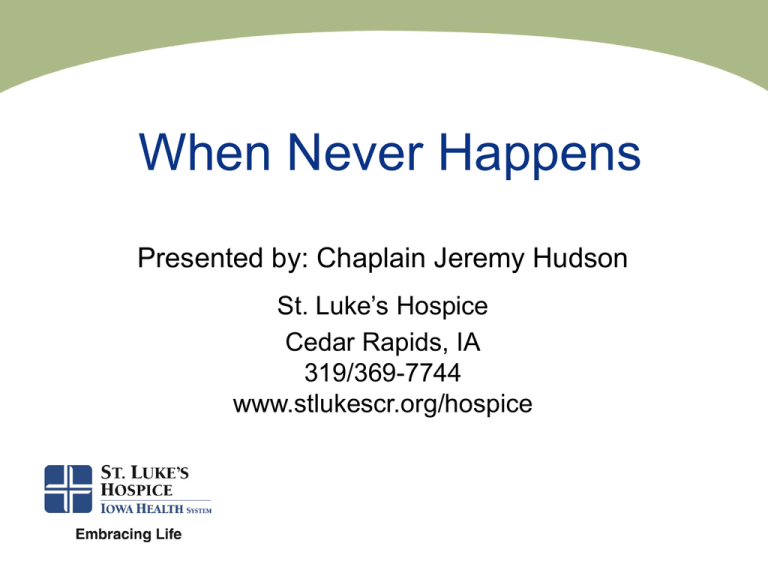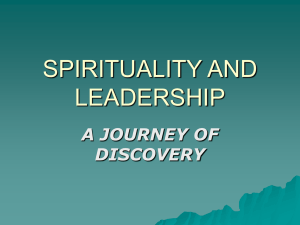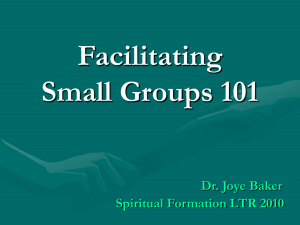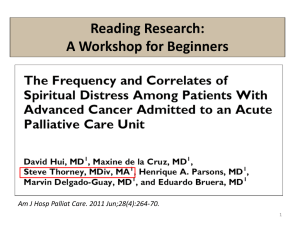Spiritual Distress on the End of Life Journey
advertisement

When Never Happens Presented by: Chaplain Jeremy Hudson St. Luke’s Hospice Cedar Rapids, IA 319/369-7744 www.stlukescr.org/hospice What are “Never Happen” events? • Stressful unanticipated events in life • Events that don’t fit in our plan for life • Stretch even the healthiest individuals, families, and communities • The impact may be cumulative Never Happen Events • Death of spouse or child • Death of a close family member (parent or sibling) • Major change in living conditions • Major change in church or spiritual activities • Major change in health of family member • Major change in financial state • Death of a close friend • Violence/Abuse • Revision of personal habits • Major change in social activities (Holmes & Rahe Social Readjustment Rating Scale) What is Spirituality? Spirituality has many definitions, but at its core spirituality helps to give our lives context. It's not necessarily connected to a specific belief system or even religious worship. Instead, it arises from your connection with yourself and with others, the development of your personal value system, and your search for meaning in life. “Spirituality and stress relief: Make the connection” By Mayo Clinic Staff What is Spiritual Distress? • Spiritual distress “a disruption in the life principle that pervades a person's entire being and that integrates and transcends one's biological and psychological nature.” (North American Nursing Diagnosis Association (NANDA), 1999, page 67) • A person’s present experience is in conflict with personal beliefs My Story Signs of Spiritual Distress • • • • • • Questioning the meaning of life Loss of purpose Being afraid to fall asleep at night Anger at God/higher power Feelings of being abandoned by God/higher power Questioning their own belief system • “What good are they?” Adapted from the Hospice and Palliative Nurses Association Signs of Spiritual Distress • • • • Feeling a sense of emptiness/direction Loss of hope Impaired ability to cope Questioning the meaning of suffering • Is this punishment? • Pain and other physical symptoms can be expressions of spiritual distress Adapted from the Hospice and Palliative Nurses Association Spirituality and Patient Outcomes Spirituality and Patient Outcomes Spirituality and Patient Outcomes No One is Immune What is a Spiritual Assessment? • An in-depth look at the patient’s spirituality • Continuous process • Multi-Dimensional – should deal with beliefs, behavior, emotions, relationships, meaning and purpose and practices. (Fitchett, G. (2002). Assessing spiritual needs: A guide for caregivers.) • Results in a spiritual care plan that includes appropriate interventions and a way to measure effectiveness (The Discipline for Pastoral Care Giving: Foundations for Outcome Oriented VandeCreek & Lucas, 2001) What is a Spiritual Screening? • Different than assessment • Generally uses one or three static questions • Aimed at determining the patient’s faith affiliation and whether the patient has special religious and/or cultural needs, such as diet, observances, and/or restrictions (e.g., blood products) • One dimensional (Fitchett, G. & Risk, J. (2009). Screening for spiritual struggle. Journal of Pastoral Care and Counseling, 63, 4.1-12. ) Spiritual Assessment Examples: 7X7 • Medical (Biological) • Psychological Dimension • Family Systems Dimension • Psycho-Social Dimension • Ethnic, Racial, Cultural Dimension • Social Issues Dimension Spiritual Dimension • Dimension Beliefs and Meaning • Vocation and Obligations • Experience and Emotions • Courage and Growth • Rituals and Practice • Community • Authority and Guidance (Fitchett, G. (2002). Assessing spiritual needs: A guide for caregivers.) Spiritual Assessment Examples: 7X7 Karen • Medical (Biological) - Terminal CA, blood transfusions no longer effective, having pain crisis due to not taking pain meds. • Psychological Dimension – Struggles with self worth. • Family Systems Dimension – Single mother of 3 children, youngest is caregiver, anger from her childhood relationship with mother. • Psycho-Social Dimension – Few friends, very close to son and grandchildren, little support outside of family, successful career. • Ethnic, Racial, Cultural Dimension – Caucasian Catholic American raised in the Midwest. Spiritual Assessment Examples: 7X7 Karen • Social Issues Dimension – reports feeling unwanted by society because of age. • Spiritual Dimension • Beliefs and Meaning – believes that God wants her to suffer because she is a bad person. The Family Systems dimension revealed that her relationship with her mother informed her image of God and how God viewed her. • Vocation and Obligations – Mother and grandmother, family is a gift from God she is to care for, now threatened by illness and death. Spiritual Assessment Examples: 7X7 Karen • Experience and Emotions – reports that she tries hard to be close to God but feels distant yet. Strong desire to be accepted by God. • Courage and Growth – Strong desire to practice her faith and “finally arrive” at a place of peace. • Rituals and Practice – Scripture study, prayer, rosary, communion, scared music, sitting on her patio in the morning (her sacred place). • Community – Loosely connect to her youngest son’s parish. • Authority and Guidance – Scripture, Catholic Church, Clergy, Her Mother FACT F – Faith (or Beliefs): What is your Faith or belief? Do you consider yourself a person of Faith or a spiritual person? What things do you believe that give your life meaning and purpose? A – Active (or Available, Accessible, Applicable): Are you currently Active in your faith community? Is support for your faith Available to you? Do you have Access to what you need to Apply your faith (or your beliefs)? LaRocca-Pitts, M. (2008b). FACT: Taking a spiritual history in a clinical setting. Journal of Health Care Chaplaincy 15, 1-12. FACT C – Coping (or Comfort); Conflicts (or Concerns): How are you Coping with your medical situation? Is your faith (your beliefs) helping you Cope? How is your faith (your beliefs) providing Comfort in light of your diagnosis? Do any of your religious beliefs or spiritual practices Conflict with medical treatment? T – Treatment plan: If patient is coping well, then either support and encourage or reassess at a later date as patient’s situation changes. If patient is coping poorly, then 1) provide direct intervention: spiritual counseling, prayer, Sacred Scripture, etc., 2) encourage patient to address these concerns with their own faith leader, or 3) make a referral to the chaplain/spiritual care coordinator for further assessment. LaRocca-Pitts, M. (2008b). FACT: Taking a spiritual history in a clinical setting. Journal of Health Care Chaplaincy 15, 1-12. Barriers to Spiritual Assessment • Discomfort of Person Assessing – Can cause avoidance in doing a proper assessment – Skip assessment – Loss of confidence by patient in the provider • Timing – Pain – Fatigue – Others present Barriers to Spiritual Assessment • Wording in the assessment • Patient/Family unable or unwilling • Knowledge of spirituality Spiritual Assessment Helps • Use your experts – Board Certified or Board Certification eligible Chaplain – Patient’s Clergy/Spiritual Caregiver • Practice, Practice, Practice • Association of Professional Chaplains – www.professionalchaplains.org Questions?







